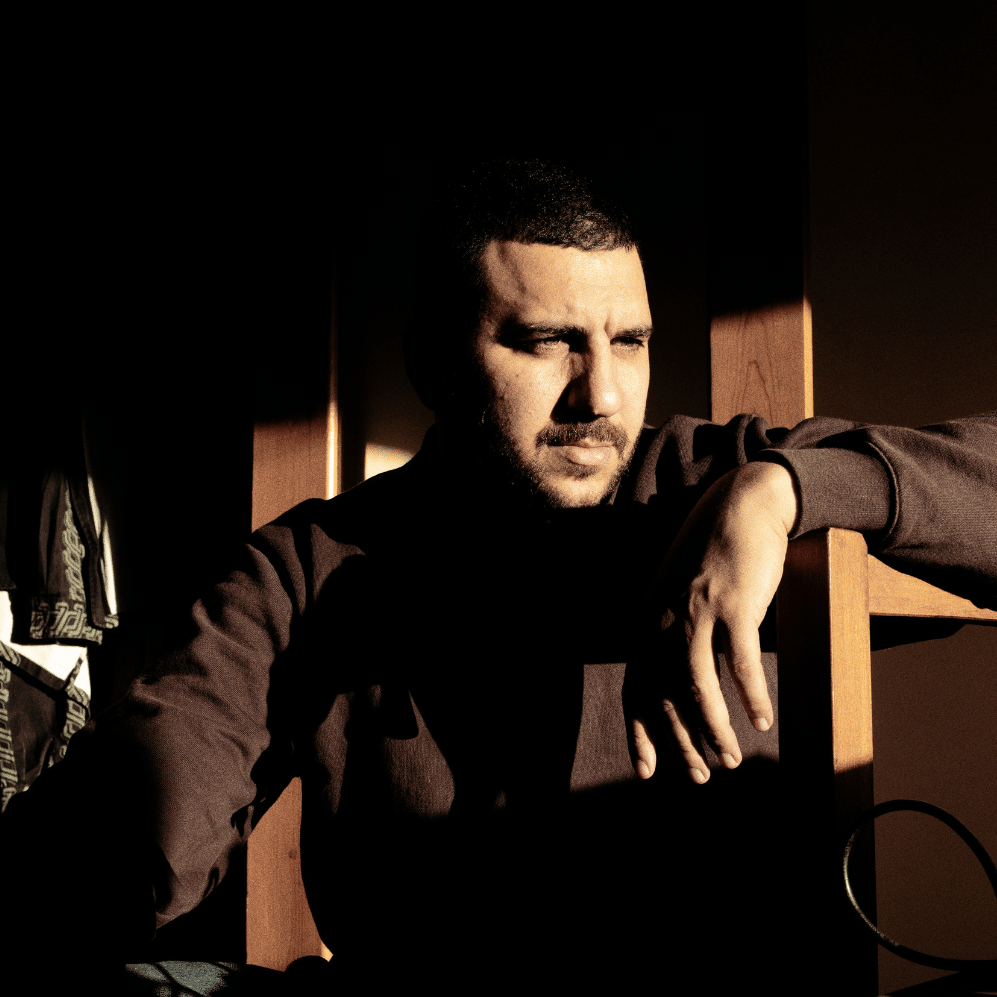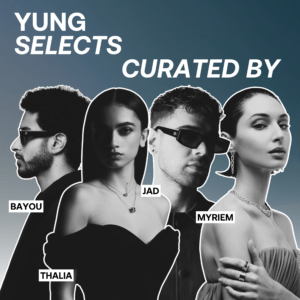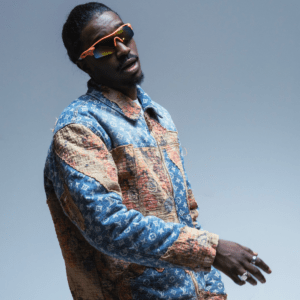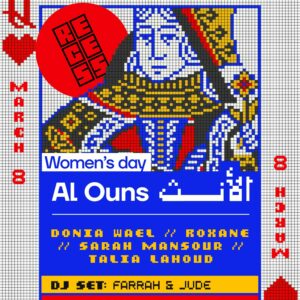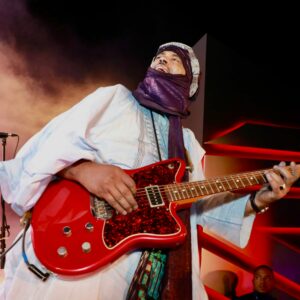The name Asem Tag rings with the deafening success of Egyptian artist Wegz. It’s understandable, Tag (Instagram) played an instrumental role as Wegz’s manager in the now superstar’s meteoric rise, his name reverberating across the MENA’s musical ecosystem. But, before assuming his managerial position, he was something of a local legend and a venerated community-builder in the embryonic days of the Egyptian underground music scene, laying down the building blocks that would serve as the foundation for the next decade of alternative, left-field dance music in Egypt.
During his heyday as a DJ and producer, Tag electrified dance-floors across Egypt and Europe with his prolific electronic music collective KIK, as well as through VENT, the Downtown Cairo watering hole he co-founded with long-time collaborator and household name ZULI, that would come to define an entire era of music, and a precedent for the kind of hard-hitting, experimental sounds he would become known for. Experimenting with an almost irreverent mix of sonic styles, Tag shut down clubs armed with his repertoire of rousing old school house, gritty hip-hop and pulverizing industrial techno, all while crafting his own intricately textured soundscapes, with his original works eventually finding a home on esteemed UK labels such as Opal Tapes and Seagrave.

Hot on the heels of the first Wireless Festival in the Middle East, with Wegz taking centre stage, sitting squarely at the top of the game, Tag took a moment to reflect on the litany of titles he’s accumulated and hats he’s worn throughout his life. With a sense of humility that is as rare as it is endearing, Tag dug into his treasure trove of memories, unraveling bits and pieces of his life with a remarkable level of introspection. When asked about the genesis of his moniker $$$TAG$$$, Assem Tag responds with a pause, a light-hearted chuckle, and a seemingly endless cascade of star-studded anecdotes that underscored the collaborative nature of his musical endeavors.
As it turns out, even his most recognizable alias was the result of a creative collaboration with fellow artists Abyusif, ZULI, and others. “One day, Abyusif insists that ZULI and I both write 16 bars on his track. When it came time to release it, I was looking for a rap name,” he recounts. In a moment of levity, someone suggested “Tag Money”. It started as a joke, then it just stuck and became my name for anything related to music.”
The 2011 Egyptian revolution served as a turning point for Tag and his creative partner ZULI, catalyzing the inception of Cairo’s premier alternative music venue and club, VENT. After the departure of high-end clientele from the renowned Downtown Cairo cabaret Arabesque due to the area’s highly politicized climate, Tag and ZULI seized the opportunity to create a space of their own, challenging the exclusive community of partygoers and promoters who controlled the means of shaping popular taste, and the stagnant, unstimulating artistic landscape. “We were frustrated with the lack of opportunities for emerging artists like ourselves, and the ecosystem of booking and how the venues really didn’t want to take any risks and always just went for whatever was already popular for traction,” he says.
VENT was the first underground venue in Egypt to welcome an array of talented, local bedroom producers, providing a platform for performance that would otherwise have been unattainable. The venue’s minimalistic, raw ambiance, unconventional acoustics, and devoted following epitomized the alternative music scene, allowing artists to explore their creativity in an experimental space. VENT pioneered innovative programming, promoting a vision of inclusivity and diversity, effectively galvanizing a burgeoning scene of musicians and enthusiasts.

While VENT shut its doors in 2013, its legacy lived on, inspiring other collectives and institutions to follow in its footsteps. “The experience itself and the way VENT operated intentionally as a community-based hub, it was just a comfortable place for a lot of things to happen, for a lot of people and collaborations. I think the spirit of it may have lived on in other newer iterations of the same kind of format,” says Tag.
Tag was also instrumental in founding Kairo is Koming (KIK), a collective of progressive electronic composers and artists that played a crucial role in cultivating Cairo’s underground electronic music scene. Although not officially affiliated, the KultKairo label grew organically from the KIK collective, forging connections and promoting Cairo’s vibrant scene by offering artists the opportunity to release their own music.
Following its clandestine Downtown launch party, KultKairo’s debut release featured Tag’s poignant EP Greater Than the Future. “It was the first time that I self-produced a solo album. I’ve always worked with a band or with a group or with a collaborator. During that time, and before that, I buried a lot of music, kind of due to self-doubt, and kind of under the guise of trying to perfect it.” With a newfound sense of conviction, Tag’s solo venture was a tribute to a loved one who passed away during the EP’s creation, imbuing it with profound sentimental value, “That’s why I didn’t let this one die. I felt that there was some kind of emotional duty or obligation to release it.”
After an arduous journey spent shaping the underground music scene, Tag emerged as a master weaver, deftly stitching together a web of connections and alliances to imbue the scene with a sense of collective identity. Unity and collaboration were the hallmarks of his approach, seeing these values as the lifeblood that would keep the scene thriving.

With an unwavering belief in the potential of underdogs, Tag was always eager to make room for up-and-coming artists, providing them with the literal and metaphorical space they needed to perform, create, and make a name for themselves. Over the years, he wore many hats and took on numerous roles within the music industry, amassing a wealth of experience and knowledge that would eventually lead him down an unexpected path.
As Tag himself put it, “Had you told me in 2011, you’re going to be an artist manager, I’d be like, get out of here. I had no idea that I was going to be here.” Despite his initial doubts, Tag discovered that all of his previous work had prepared him for this new challenge. “I just started realizing that I had all of the components [needed] to manage an artist,” he explained.
A chance encounter with a new artist named Wegz led to a fruitful collaboration that would ultimately yield incredible results. Together, Tag and Wegz found numerous areas of synergy and common ground, building a friendship and a professional partnership that would take them to new heights.
Tag brought this same passion and vision to his talent agency, TMT Talent, and event planning organization, TMTM Live. With the experience gained with Wegz as a template, he sought to create a literal platform for other artists to customize and make their own, placing the artist’s vision and voice at the forefront. “The idea was to get into the mind of the artist and see how they want to present themselves, how they want the audience to experience [their performances and music],” he explained. “We’re doing that kind of same format with a lot of other artists, launching their live on-ground experience, so that when you go to a concert, it’s no longer ‘Wegz performed during a concert done by this promoter’. It’s just Wegz by Wegz.”
As Tag emphasizes, “Surrounding yourself with the right people is key to any kind of development or success.” At the heart of all his endeavors was a simple yet powerful insight: “You need to have the right collaborators, the right partners, and the right community.” Through his tireless effort, he has built just such a community, one that embraces diversity, collaboration, and innovation and that will continue to shape and reshape the music scene for years to come.

Despite his instrumental role in engineering Wegz’s career, he takes no credit for the artist’s musical output. In fact, he attributes Wegz’s sound development to his own unwavering creativity and desire to push the boundaries of his sound and explore fresh sonic ideas. “When it comes to Wegz developing his sound, that’s all him,” Tag says with a tinge of admiration in his voice. “He doesn’t like to stay in the same place sonically. He’s always looking for the next fresh ideas, always experimenting, always listening to music from all over the world. He’s digging a lot. I think that’s why the sound is always evolving.”
“I think why Wegz is more successful than his counterparts in what we’ll call the rap scene is that he has consciously taken these steps away from rap and hip hop,” says Tag. According to him, Wegz’s conscious decision to move beyond the boundaries of rap and hip hop, without disowning his roots, is what propelled him forward. “It’s his roots and what he started with, but he doesn’t identify as just a rapper,” Tag notes. “He is more than that. That’s why he evolved into that popstar status.”
Despite almost single-handedly pioneering the underground scene in Egypt and creating one of the country’s most popular musical exports in recent years, Asem Tag is a study in humility and remains dedicated to the collaborative process of music-making. Throughout his prolific career, he seems to have always sought out the underdog, given it his all to offer them a platform and dedicate his work to progressing a scene that otherwise may have remained stagnant. When asked what he thought his legacy would be, he took a long pause and considered the question, eventually revealing that he’s had the same goal all along, from his early days spinning thumping techno at VENT to managing one of the MENA’s leading artists: “I just want to do that for as long as I can – help the sound and the artists of the Middle East go as far as they can reach on the global scale and export Arab culture to the world.”
Asem Tag and his story serve as reminders that even the most successful artists are shaped not only by their own talents, but also by the creative community that surrounds them.
Photography: kafrawy (Instagram) for YUNG
For more stories about music and pioneers from the region and beyond, like Asem Tag, be sure to check out our dedicated pages.
